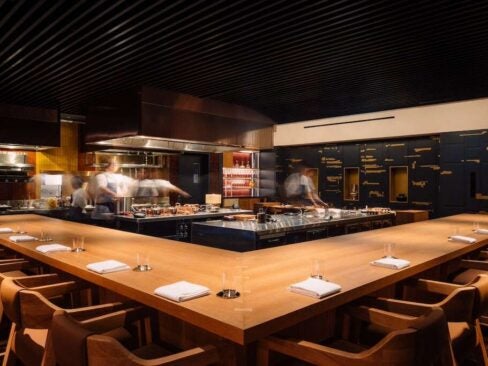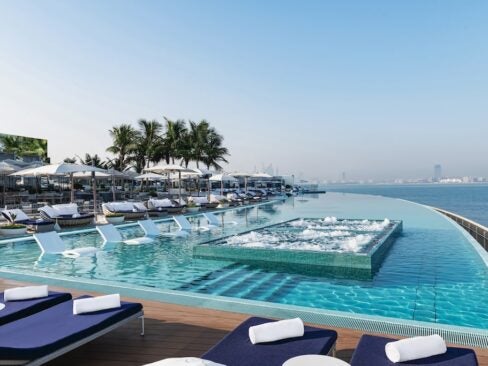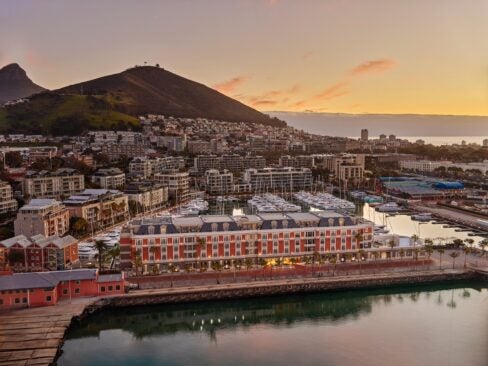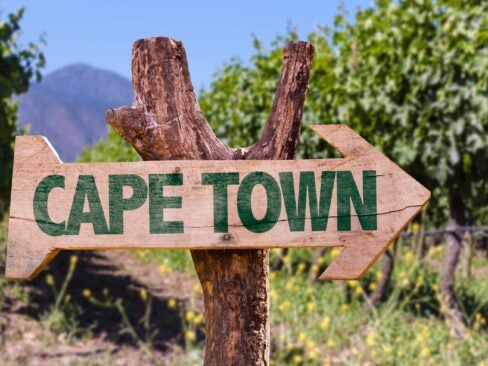Elite Traveler: How did Swire get involved in hotels?
 Swire Pacific is the largest shareholder in perennial top airline Cathay Pacific Airways, however unlike other airline entities that have been involved in the hotel business, Swire’s play came from a different direction: It was already a leading property developer and in fact owned hotels but left the management to others. For example, the Conrad, JW Marriott and Shangri-la in Hong Kong’s Pacific Place are partially owned by Swire. With its “House” brand gaining acclaim for top service and innovation, and two more brands being nurtured, Elite Traveler Editor-in-Chief traveled to Hong Kong where he talked with Managing Director Brian Williams at the company’s award-winning Upper House.
Swire Pacific is the largest shareholder in perennial top airline Cathay Pacific Airways, however unlike other airline entities that have been involved in the hotel business, Swire’s play came from a different direction: It was already a leading property developer and in fact owned hotels but left the management to others. For example, the Conrad, JW Marriott and Shangri-la in Hong Kong’s Pacific Place are partially owned by Swire. With its “House” brand gaining acclaim for top service and innovation, and two more brands being nurtured, Elite Traveler Editor-in-Chief traveled to Hong Kong where he talked with Managing Director Brian Williams at the company’s award-winning Upper House.
Brian Williams: Swire has been in the property business for some time, starting in the Seventies with various developments. Taikoo Shing was one of the first, from office development to mixed-use development. It was as early as the mid-eighties that we started developing hotels, all branded by third party operators, particularly Pacific Place, an interest in JW Marriot, Conrad, Island Shangri-La, all of which we developed and retained an ownership position. Then a bit later we developed the Novotel Citygate in Tung Shun and also retained an ownership there.
By this time we had a quite a bit of money invested in hotels already, so by default we became hoteliers but more on the ownership side. About seven or eight years ago, when we looked forward at where things were going in Hong Kong and China, it seemed obvious that we had two choices. We were either going to continue to own hotels and have it operated by third party managements companies or we would look at creating our own brands, managing our own assets, which would give us greater flexibility in numbers, greater flexibility in use of real estate and greater flexibly overall.
ET: Can you give us an overview of the portfolio as it relates to your brands?
BW: The Opposite House in Beijing was the first, which opened in August of 2008, around the time of the Olympics, followed by the Upper House in October of 2009, then East Hong Kong in 2010, followed by East Beijing in October of 2012. We then acquired a group of boutique hotels in UK called Chapter Hotels, small up-scale boutique hotels in various towns and cities throughout UK. Temple House in Chengdu, China is our next opening in third quarter 2014.
ET: How are the brands positioned?
BW: It’s very straight-forward. The House Collection is positioned to be a small-scale unique hotel experience. Our guests aren’t looking for a cookie-cutter spot. With the House Collection, we look at the local market and make it work for each. The House brand is small-scale, as each hotel is under 120 rooms. It operates at the very high-end of the luxury hotel market. Our goal is to be in the top three, RevPAR, but at the same time doing any asset reinforcement. This means reinforcing any of our product lines with luxury retail trade, luxury shopping experience. There is a large synergy between very up-market retail and very up-market hotels. We find that people who stay with us are either buying (luxury) products (in our shopping centers) or selling those products. East is our second tier brand, which is because each hotel has a larger number of rooms. East Hotels are very high-end, full-service and luxury accommodating experiences for our customers. Rates are lower than our House Collection, which gives us more flexibility, and gives more value for the money. I would compare the two brands more along the lines of first class and business class. Chapter Hotels in the UK is an interesting designer boutique part of the brand.
ET: How do you see the portfolio growing?
BW: Like most large hotel companies, who tend to start out as we had, owner-developed/operated, comes a responsibility to focus very clearly on developing our own assets, mixed use developments. It has made us focus more on asset management, and maximize on the return on investment. We’ve got three hotels to open within the next three years that have been confirmed, which is Chengdu next year, Miami the following year and Shanghai the year after that. We are really focusing on our existing hotels to maintain our place in the market and to make them better everyday. We’ll see how it goes after that.
ET: Do you plan to get into the management game?
BW: Maybe in the future if we feel that we’ve maxed out on what we do best, but this is not in the plans as of now.
ET: Any plans for expanding Chapter Hotels out of the UK?
BW: UK / Europe are such different markets. We like what we’ve done there. The hotels are performing very well within their markets. At this point we are standing back on expanding, but obviously if there is opportunity to do so in the future we will cross that bridge if it is the appropriate decision.
ET: You have a beautiful hotel here in Hong Kong. What separates you from the other high-end luxury hotels?
BW: There are a few things that separate us from the others. We are not a ubiquitous brand. We are quite unique. We are smaller scale in the luxury market. Over the last 20 years, big luxury resorts were the thing to do. Now people want more exclusivity. A luxury traveler can go down and have breakfast with 300 others or just a few. It all really depends on the individual’s preferences. We are zeroing in on the customer who wants more of a private and exclusive experience. It is exactly why people fly private jets. We don’t hold big events that would change the character of the hotel.
ET: How about the people element?
BW: We hire people who “match our brand” if you will, people with a certain character and individuality. We believe it is very important to have people on our team with creative personalities. We see that customers really like this and respond very well to this. We are proud of the way we engage with our or staff. From day one we said that our brand is about our people. We don’t have a traditional training program, and we have never written any manuals, statements or scripts for our staff to follow. We want them to be themselves. We have a very engaging, bright and energetic group of people working here.
ET: Do you recruit through different channels than typical hotels?
BW: We have quite a few who have come out of traditional hotels and hotel schools, but it is not a requirement to have any experience. We will train people, we do allow people to learn as they go. Most of our management does come from a very traditional five star background. They tend to have this creative character that has been dying to come out, and they have certainly found a place here with us. The backbone of our hotels are very solid, with an excellence in technology as well.
ET: Do you find that when you are recruiting people, you steer clear of certain places?
BW: All of our staff carry two cards, one with their name and information and one that says, “We want people like you” to give out as they see fit, whether to their grocer or to somebody working at a funeral parlor. It’s about whether they find the brand.
ET: Upper House was a pioneer in cross-utilizing staff. How’s it working?
BW: Amazing. Our front-desk, concierge, bell-boy could be one person. Everybody does everything. In our small hotels we don’t actually have check-in or check-out. You don’t have to check out of our hotels. Just tell us you’ve left via email. Not charging for mini bar, really helps avoid those awkward moments.
ET: And you were one of the first to dump the hard copy books of information and room service. And pushback?
BW: No! Our rooms are clutter free, therefore no guides, books, banners, etc. If you need something, just ask. Of course we have tea, coffee and snacks, which is all complimentary. We welcome you in person, no need for a welcome letter.
ET: So no requests for the old hard copy room service menus?
BW: Surprisingly not at all. Once in a while someone may call for a print up of something, but it is very rare.
ET: And you are skipping the spa mania trend?
BW: We didn’t put a spa in our Beijing or Hong Kong hotels. I didn’t believe that we would lose a significant amount of business if we did not include a spa, and we haven’t. People come where to shop, eat and play or work for two to three days for the most part. We rarely have people asking about this. We are however going to be putting a spa into our Chengdu Hotel.
ET: What’s next in technology?
BW: For the Miami Hotel we are looking into how guests can check in and check out online. In theory you will get an email that day that says you may check in, use your smart phone to do so, then use your smart phone to open your room door as well. We want our guests to be able have the best and easiest experience as possible. We also want to be careful. We don’t want to lose the personal touches, and we don’t want to go too far and have everything go terribly wrong. We need to be very smart here.
ET: What are the biggest lessons you’ve learned being in this industry?
BW: Not to sound too cliche, but its all about having the right people around you. I could never do what I do it without my team. I never have to think about any of our products or hotels. Everything and all of our rooms are always in excellent shape. I never have to worry about our product.










